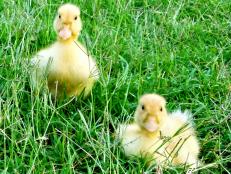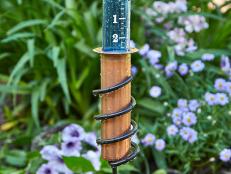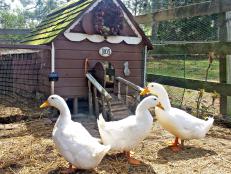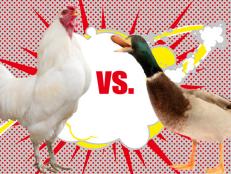Raising Ducks: A Primer on Duck Housing, Diet and Health
Learn what ducks eat and how to ensure they are comfortable and healthy.

Raising ducks can be both fun and rewarding and ducks are relatively inexpensive to feed and house. People raise ducks for a few different reasons including pest control, egg production or lawn maintenance. Ducks are also intelligent, social animals, and, depending on the species and the care, they can live up to 20 years. If you’ve been considering raising ducks, here’s how to ensure your ducks are comfortable, healthy and well-fed

Lisa Steele
Housing Requirements for Ducks
There are some similarities between raising chickens and ducks. Both birds need a consistent feeding schedule and an enclosed shelter and room to roam, but ducks also need access to a pond or pool.
“The biggest difference between raising chickens and ducks is their water needs,” says Stephanie Moratto, a homesteader who has been raising ducks for more than four years. “Ducks need some form of kiddie pool or pond so they can dunk their heads to clean their eyes and nostrils.”
Like chickens, ducks need a coop or house in addition to plenty of yard space. A duck house should be at least 3 feet tall to provide adequate headroom and airflow. Ducks emit a lot of moisture when they breathe, so adequate ventilation is also very important.
“It's a rule of thumb to have at least 10 square feet of space per duck in a coop with a run or outdoor area so they can forage,” Moratto says. “Ducks should also have an area to nest inside their shelter.”
Inside the coop, a layer of straw will suffice for bedding and nesting material. Unlike chickens, ducks don’t perch on top of the straw but will nestle down in the straw. The straw should be changed out regularly and always removed immediately if it’s wet or if there’s any whiff of an ammonia smell.
“I would also say that ducks are way messier (as far as droppings go) than chickens when "cooped" up in a duck house,” Morrato said. “Potential duck owners need to realize that yes, they are cute as ducklings, but they will grow up to be big ducks that can be very messy.”
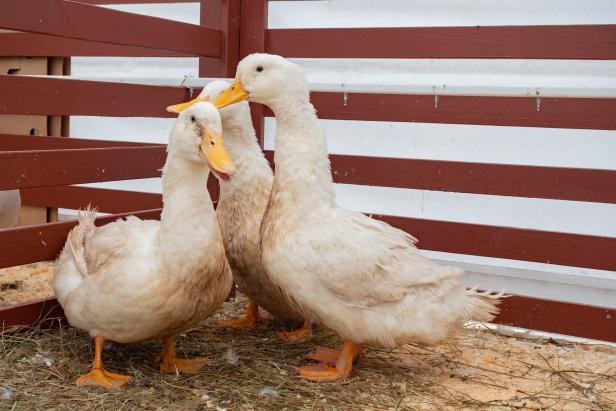
FOTOGRIN
Food Requirements
Ducks should have a daily diet of duck feed that can be supplemented by suitable fruits and vegetables. Ducks eat by grabbing a mouthful of food and then dunking their bills into the water and swishing it around, so they must have easy access to clean water.
Duck feed should be set out in wide tubs or containers that can’t be tipped over. Leftover feed and at the end of the day feed should be discarded if it has gotten wet.
“Ducks need access to lots of water for drinking and feeding,” Moratto says. “As for food, a commercial duck feed works well (available pet stores or home and garden stores), and baby ducks require a starter feed with higher niacin content until they’re about six months old. Ducklings grow extremely fast and the niacin helps their bones develop correctly.”
A grown duck will eat 4-to-6 ounces of feed per day, but that amount varies by time of year since they eat more in the winter and less in the summer when weeds and bugs are more readily available. Ducks also enjoy leafy greens, fresh peas, corn kernels, cucumber pieces, watermelon and cut tomatoes.
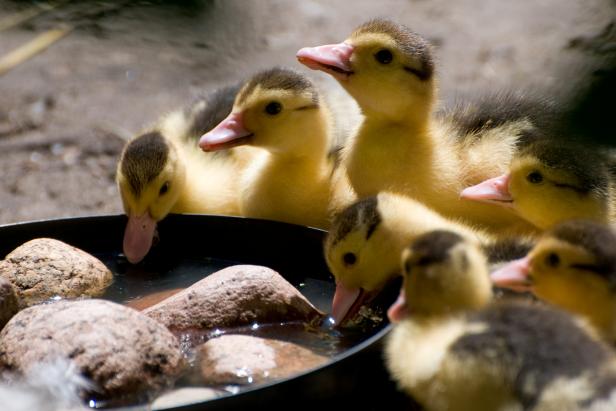
Ariene Studio
How to Protect Them From Predators
Most domestic ducks can’t fly, which leaves them extremely vulnerable to predators such as foxes, raccoons and dogs. Ducks are pretty cumbersome on dry land and can’t escape these predators, so as backyard duck keepers it’s our responsibility to provide them with a safe, secure place to live.
“A coop or enclosure that can be locked up at night is the best way to protect ducks from predators,” Morrato said. “Also if there is a pond, ducks can protect themselves by swimming to the middle so the predator can’t get to them.”
Duck housing needs to be secure from predators, but other than that, ducks are pretty winter-resistant, so any structure you provide for them won’t need any type of heat in the winter. Since ducks love both rain and snow, they don’t spend many waking hours indoors.
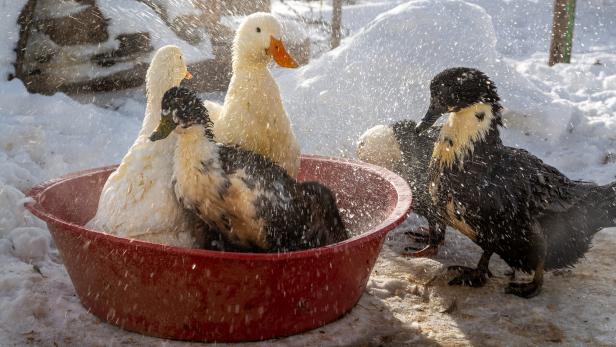
I'm Conqueror
Health Concerns to Watch For
Ducks are generally healthy and hardy, but it’s helpful to have a vet handy in case health concerns arise. Keep in mind that many vets don’t service poultry like chickens or ducks, and as an alternative, you could reach out to an experienced duck owner.
Unlike other pets, ducks don’t need vaccinations or annual shots and don’t need preventative worming. They aren’t quite as susceptible to external parasites (such as ticks, lice and mites) as chickens since they spend so much time in the water, which drowns any parasites that might be present. However, there are a few things to watch out for in your backyard flock:
Angel Wing is a non-life threatening condition in which the wing doesn’t lie flat against the body. It’s caused by overfeeding high protein food, which causes the wing to grow too fast and can be reversed by switching to a lower protein feed, providing plenty of exercise and putting the wing in a sling.
Aspergillosis is caused by fungal spores and causes heavy, labored breathing, but it’s easily preventable by removing wet feed and bedding promptly.
Bound Crop happens when foreign objects, strings or long grasses can get lodged in the upper part of the digestive system. The duck’s throat area may look swollen or feel hard. Massaging can help, as can a regimen of vegetable oil to try and break up the mass and allow it to pass.
Botulism is prevalent in warm weather and thrives in decaying waste or pools of water. It is important to keep water sources clean (consider using white vinegar and a scrub brush on the water tubs or pool regularly) because botulism can cause death within hours.
Bumblefoot is the most common affliction of ducks but affects mainly the heavier breeds. The infection is caused by a cut on the underside of the foot, so keeping the duck pen free of sharp stones, branches and other foreign objects is helpful. The cut should be treated immediately to prevent the infection from spreading and causing potential lameness
Egg Binding occurs when a duck is unable to pass an egg. Often it is possible to soak the duck in a warm bath and then apply vegetable oil around the vent to encourage the muscles to relax enough to let the egg out.
Eye Infections can be a result of rough mating and look like bubbling around the eyes since the male duck (or drake) grabs the back of the female’s neck where her sinuses are located. Saline rinses can help clear this up as can access to a clean pool or tub of water. Ammonia buildup as well as dust can also cause eye irritations so clean straw bedding in the duck house is important.
As scary as some of these conditions sound, lots of preventatives and good duck yard sanitation go a long way toward raising a healthy flock.






